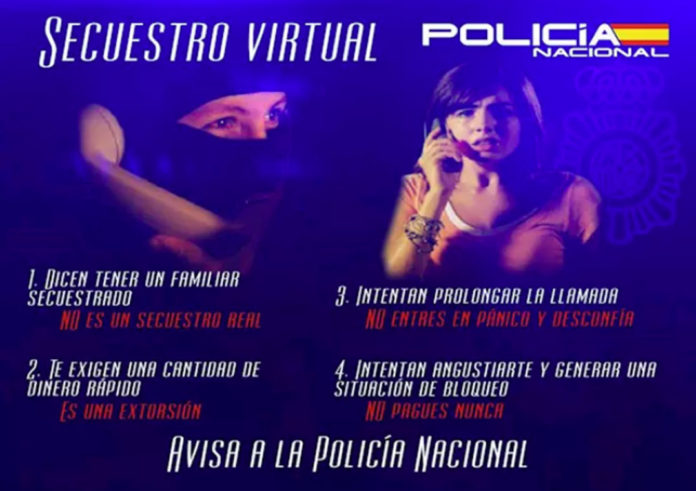- In 2019 the National Police dealt with 130 cases of virtual kidnapping in Spain, of which there was an economic outlay in five.
The rapid response of the National Police in Madrid has prevented the victim of a virtual kidnapping from paying 10,000 euros to prevent her kidnapped daughter from the threat of being harmed.
The victim is a 69-year-old woman residing in Madrid. While she was at home, she received a phone call from a man with a foreign accent who told her that he had kidnapped her daughter and that in order to see her again she had to pay 10,000 euros.
In fact, he ordered her to go to her bank immediately, under the threat of cutting her daughter’s finger and sending her a video of the act.
While the virtual kidnapper kept the victim on the phone, she walked to the bank, where she met a National Police patrol.
The victim’s husband had called 091 just a few minutes before to report what was happening and the rapid response of the agents allowed no moneys to be withdrawn.
At the same time, other agents went to the workplace of the alleged kidnapping, where they found the daughter t be perfectly well, according to the Headquarters of the National Police in Madrid in a press release on Saturday.
EMOTIONAL TRAUMA AND FAST MONEY
This criminal modality is known as virtual kidnapping, a scam that during 2019 has seen the National Police deal with 130 cases, of which there was an economic outlay in five of them with the money recovered in just two.
Under the hashtag #NoEsReal, in social networks the National Police offer information and advice on how to react in case of receiving a call of this type.
Among the main characteristics of the virtual kidnappings are the surprise and the state of anguish in which the victim is put. They are usually unexpected calls from hidden numbers or with a prefix from abroad.
What criminals are looking for is to cause maximum distress and emotional blockage, so they are very aggressive and direct, they can even put third parties on the phone that mimic cries and screams of the alleged victims.
Another of the tactics used by the virtual kidnappers is to try to keep the recipient of the call on the phone so that they cannot notify the police and obtain the money without hanging up, mainly through money transfer companies.
130 CASES IN 2019
During the last year, the specialised investigators of the Kidnapping and Extortion Section of the National Police have handled a total of 130 cases of virtual kidnappings in Spain, mainly in Madrid, Cantabria, Zaragoza and Valencia.
Of these 130 cases, in 107 a complaint was filed, five paid money and twice that money was recovered.
Police units are prepared to react as soon as an attempted virtual kidnapping is reported.
But basic prevention guidelines can also stop members of the public from becoming victims of this type of extortion. The first is to distrust the caller if they tell you that they have kidnapped a family member, even if another person is placed or background voices can be heard, and remain calm in the face of pressure from the false kidnapper, who will use verbal violence to try to convince you differently.
It is also necessary to check the information that the false kidnappers are providing, don’t make any payments, do not provide personal data and don’t publish it on social networks. Notify the National Police (091) and try to locate the alleged kidnapped by another line, as well as Record the malicious call if you can.





